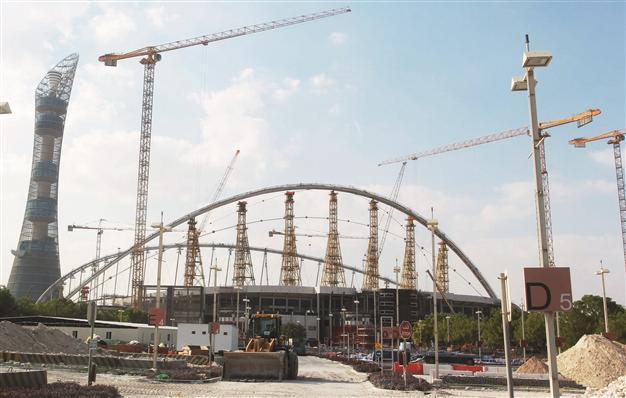Qatar’s expected deportation of workers raising concerns
James M. Dorsey

This file photo shows the Khalifa Stadium under contruction in Doha. FIFA has cleared Qatar of any graft in landing the right to host the 2022 World Cup, but serious questions remain about gross violations of workers’ rights.
Qatar has signaled its intention to reject demands by activists to grant union and collective bargaining rights to migrant workers with the expected deportation of around 100 South Asian laborers who went on strike to protest low pay and poor conditions.Doha News reported that the workers, among the lowest paid in the wealthy Gulf state, were arrested on the third day of their strike after scuffles broke out with police. Those detained were among some 800 striking workers primarily employed by two companies, Qatar Freelance Trading & Contracting and Qatar Middle East Co.
Online business directories describe Qatar Freelance Trading & Contracting as a manpower supplier or recruitment agency. A Qatar Foundation study designed to set out ethical standards for the recruitment of foreign labor earlier this year defined manpower suppliers as “agencies that recruit and ‘warehouse’ migrant labor, hiring (or leasing) them out to companies and other organizations on short-term or seasonal bases.”
Quoting anonymous executives of unidentified agencies, the report suggested that workers employed by these agencies were forced to pay for the cost of their recruitment in violation of what the foundation defined as ethical recruitment principles that seek to ensure workers’ rights and shield them from exploitation. The 162-page report said it was able to identify only two agencies that it would define as ethical recruiters.
Striking workers told Doha News that they were paid less than the legal minimum wage in Nepal and were refused compensation if they fell ill. The workers charged that once in Qatar they had been forced to replace contracts they had signed before their departure with blank agreements which meant they were being paid less than had been originally agreed and enjoyed fewer benefits such as a food allowance.
A Nepalese news website said Qatari officials and Nepalese diplomats had visited the workers before the strike. Those visits appear, however, to have produced no improvement of their situation.
A spokesman for Qatar Freelance Trading and Contracting denied the allegations in an interview with Doha News and said the workers were simply trying to get higher pay. He said a number of workers had requested repatriation.
The strike occurred as more than 90 human rights groups and trade unions issued a statement demanding abolition of the region’s kafala or sponsorship system that puts workers at the mercy of their employers; ratify and implement international labor and human rights standards; and engage with trade unions. The statement highlighted the plight of domestic workers, the most vulnerable group of foreign labor, because they often are not included in legal labor provisions.
Hardening of attitudes
Gulf states, including Qatar, are about to adopt a standardized contract for domestic workers that would grant them the right to a weekly day off, having their own living arrangements rather than being forced to live with their employer, a six-hour working day with paid overtime, and the right to travel. Trade unionists said they were reserving judgment until they had seen a draft of the standardized contract.
Human rights and trade union activists worry that the government’s handling of the strike could signal a hardening of attitudes. Qatar has been susceptible to pressure by human rights and trade union activists ever since it won the right to host the 2022 World Cup four years ago.
The activists had hoped that workers’ political rights such as independent trade unions and collective bargaining would become possible as part of a gradual reform process that would start with improved working and living conditions. Despite engagement with the activists – in stark contrast to attitudes in other Gulf states that bar entry and detain critics – Qatar has yet to enact lofty promises of change.
The handling of the strike suggests not only that Qatar, a comparatively enlightened autocracy, has no intention of political liberalization at the end of the process, but that even those issues Qatar is willing to discuss are at risk.
The intervention by the police effectively deprived the workers of their last resort to voice legitimate grievances that violate existing Qatari rules and regulations, as well as Qatari promises of reform. In the absence of an investigation of the reasons for the strike, it reduced the police to acting as the private security arm of potentially abusive employers.
In a stark condemnation, International Trade Union Confederation (ITUC) Secretary-General Sharan Burrow, one of Qatar’s most uncompromising critics, charged that “Qatar’s brutal disregard for migrant workers is on display once again. The ‘labor reforms’ promised by the authorities add up to nothing, and [world soccer body] FIFA, the athletics body IAAF, multinationals and others, which are getting a free ride on the back of modern slavery in Qatar, should be ashamed to be in league with a dictatorship like this,” Burrow said.
















